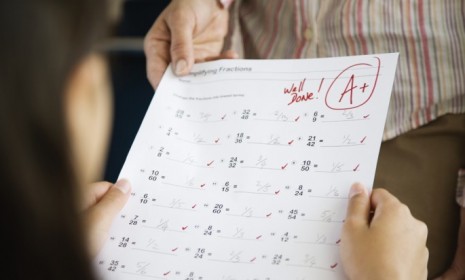Should college students be allowed to bet on their grades?
A new website allows university students to place financial wagers on their GPAs. Unethical, or a creative incentive to study?

A free daily email with the biggest news stories of the day – and the best features from TheWeek.com
You are now subscribed
Your newsletter sign-up was successful
Smart college kids can now make money with As. A new website allows students at 36 schools nationwide to gamble on their GPA. There's good money to be made, too: If a first-year student bets $20 that she will graduate with a 4.0 average, there's $2,000 to be made. Flailing freshmen can even buy "grade insurance" to hedge against flunking classes. Ultrinisic.com circumvents anti-gambling laws by rewarding skill, rather than chance — but is it really ethical to allow students to bet on their academic prowess?
Creating your own incentives is no bad thing: I like it, says Donald Marron in The Christian Science Monitor. The prospect of a payout provides an ideal "financial incentive to get your future self to study a bit harder." Although the idea of hedging against bad grades sounds like a "moral hazard," Ultrinsic will no doubt "offer such high premiums" that students will avoid buying it.
"It's back to school season. Time to lay your bets?"
The Week
Escape your echo chamber. Get the facts behind the news, plus analysis from multiple perspectives.

Sign up for The Week's Free Newsletters
From our morning news briefing to a weekly Good News Newsletter, get the best of The Week delivered directly to your inbox.
From our morning news briefing to a weekly Good News Newsletter, get the best of The Week delivered directly to your inbox.
It will encourage cheating: The idea that this will make students work harder is a "cop-out," says Alexander McCormick, director of the National Survey for Student Engagement, quoted in USA Today. In fact, it's more likely it will provoke "cheating, grade-grubbing and bribery" from more "academically dishonest" students. The only incentive it will provide is for figuring out how to beat the system.
"Gambling on grades? Some educators say don't bet on it"
There's easy money to be made... from dumb students: I'm sure many brainiacs will see this as "easy money," says Terrence O'Brien at Switched. But if Ultrinsic's aim is really to get students to study harder, won't it "do nothing but lose money"? More realistically, the goal seems to be "to prey on the under-performing students of America."
"Ultrinsic puts Vegas-style odds on your academic career"
A free daily email with the biggest news stories of the day – and the best features from TheWeek.com